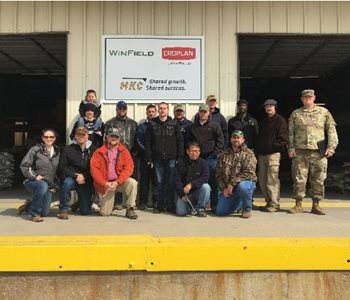Agriculture Helps Service Members Transition
Aug 30, 2019

There are currently 2.3 million transitioning U.S. veterans and soldiers. As many as 40% face some kind of physical, mental or behavior challenge when they come home and adjust to civilian life. In a response to serve national needs, Gary LaGrange, veteran and founder of the SAVE Farm saw possibility.
LaGrange’s daughter was a psychiatrist at Fort Riley for six years. During her time there, she noted that servicemembers were considerably more relaxed in the greenhouse than the office. That simple observation led LaGrange to seek more information about agricultural work for veterans. He got in contact with the Veterans Affairs office and came across more interesting data. The VA states that 2.3 million veterans and transitioning servicemembers exist and of those servicemembers, 40 percent wish to farm.
LaGrange connected the dots between VA and USDA statistics and formed a plan for the Servicemember Agricultural Vocational Education (SAVE) Farm in 2015.
“Our primary mission is to support servicemembers as they transition into civilian life. We want to facilitate healing for those in need and help them find a purpose through agriculture,” LaGrange said.
Since 2015, the SAVE farm has continued to grow. Their holistic approach to educating servicemembers about agriculture includes provided housing, counseling and of course, vocational training. They focus on four pillars of growth, transition, training, therapy and succession. Currently, the SAVE farm is building facilities to ensure students will be well taken care of while learning new skills.
The lack of facilities has not stopped the SAVE farm from working toward their mission. They started beekeeping in 2016 and that business has grown exponentially. For now, their classes are mostly based out of their honey and apiary supply store. So far, they have trained 360 servicemembers to run farms of their own, and the number continues to grow. In 2018, the SAVE farm participated in their second harvest season on the 320 acres they currently farm.
When MKC Precision Ag Specialist, Craig Miller, first heard of the SAVE Farm, he knew their mission aligned with MKC’s. LaGrange visited Miller’s office hoping for aid with spraying and planting, what he received was much more.
“This operation is just getting off the ground and helping them from day one is just as important as being there when they expand,” Miller said.
The farm is now officially enrolled in the Optimal Acre Program. They receive grid soil samples and precision agriculture technology that allows the farm to track trends in their fields, at no cost to the program. MKC provided grain trucks for the farm during harvest and hauled the grain to the Manhattan location for storage.
MKC is currently working with the farm to garner more support from partner companies.
“It’s extraordinary for MKC to reach out to us wanting to help. Because of MKC, we are able to save the dollars for training that would’ve been consumed by spraying, seed cost, storage and hauling,” LaGrange said. “MKC also plays a vital role in educating our students about how the cooperative fits into the fabric of agriculture. Every student that has participated in our program has passed through MKC’s doors and learned from the workers there.”
As the SAVE Farm grows, MKC plans to be there, helping however they can. Whether it’s providing services for the fields, or educating servicemembers about futures markets, MKC is excited to continue in partnership with the SAVE Farm.
For individuals wishing to help the farm, LaGrange asks for advocacy, collaboration, advice, assistance and if available, resources. For more information on how you can help, visit www.thesavefarm.org.